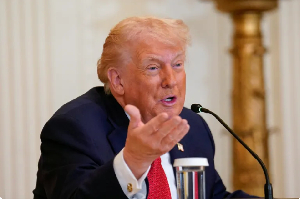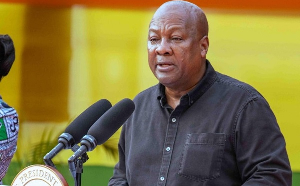Accra Feb. 25, GNA - A Human Rights Court in Accra will on April 8, rule on whether or not the Economic Organised Crime Organisation (EOCO) violated the rights and privacy of the Ghana Football Association (GFA) whe= n it invaded its premises on December 8, last year and took away some computers for investigations.
This was after Mr Thaddeus Sory, counsel for the GFA and Dr Philip Anderson, counsel for EOCO had argued their cases before the court presided over by Mr Justice U. P Dery. The basis for the application before the court was that on December 8, 2010, EOCO in executing an order of a court, proceeded to the offices of th= e GFA and took away some computers and documents.
Moving a motion to invoke the jurisdiction of the court to enforce GFA's fundamental human rights, Mr Sory noted that EOCO was to retrieve documents and not computers and mobile phones of some association's personnel. Mr Sory submitted that the EOCO in executing the court order extended their mandates further to other areas other than retrieval of the documents= .. He said if the EOCO thought it wise to include computers, they should have stated that before the court or file an amendment to the orders of the court. Mr Sory also noted that the EOCO did not tell the GFA as to whom they were investigating. "The respondents did not tell whether the President of the GFA or th= e Chairman of the Professional League Board who was being investigated. "The mode by which the EOCO carried out the order was done in bad fa= ith and it was not true that the GFA President had had discussions with the EOCO," Mr Sory added.
According to Mr Sory, the EOCO had breached its obligations under the Constitution and did not also comply with their own Act. Mr Sory pointed out that the EOCO only went behind the court to do wha= t it was not asked to do by the court, noting that the insertion of the word computers on the order was an after thought. He said the EOCO had no powers to go into the activities going on between the GFA and its private sponsors. Counsel further pointed out that under the EOCO's Act, Act 304 they could have extended their operations into matters where the state had lost funds and also where there had been tax evasion or other serious offences including human trafficking and sex exploitation. He admitted that the GFA had some agreement with some private organisations in terms of sponsorship package but that did not amount to lost of funds by the state. Mr Sory said there must be facts on the ground to call for investigations. In his response, Dr Anderson opposed to the application filed by the GFA saying they acted fairly and reasonably and the EOCO did not breach the right and privacy of the GFA. Citing Act 724 under the Insurance Act of 2006, he said the definitio= n of documents included information stored electronically and that fell withi= n the orders of the court.
Dr Anderson debunked the GFA's assertion that the insertion of computers in the court orders was an after thought. He said the EOCO wrote to the GFA over the investigations to be conducted and it further went ahead to hold discussion with the GFA boss after he had visited their offices.
"It is false that Mr Kwesi Nyantakyi did not know the purpose for which he was invited into the offices of the EOCO and even when we wrote to them they responded," he added.
According to Dr Anderson, EOCO's search at the GFA was in accordanc= e with the EOCO's procedures and the law. He said the EOCO was investigating matters concerning financial loss to the state, and questioned, 93Twenty-two (22) million dollars was spent on the World Cup and that should not be accounted for." Dr Anderson pointed out that the EOCO had statutory duty to investigate all institutions and the GFA cannot be exempted or discriminated. He denied that EOCO took some mobile phones away during the search adding EOCO did not violate the rights of the GFA.
Sports News of Friday, 25 February 2011
Source: GNA












